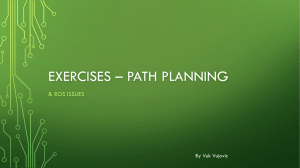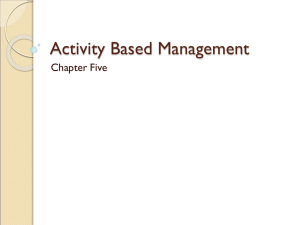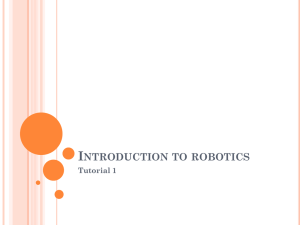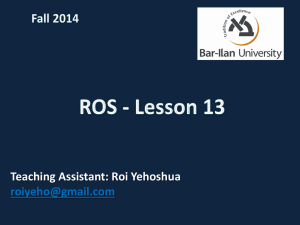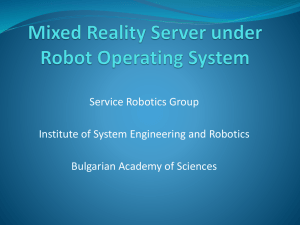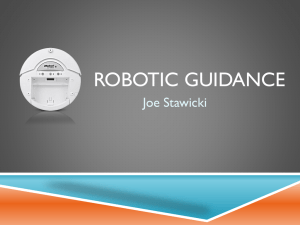Lesson 1
advertisement
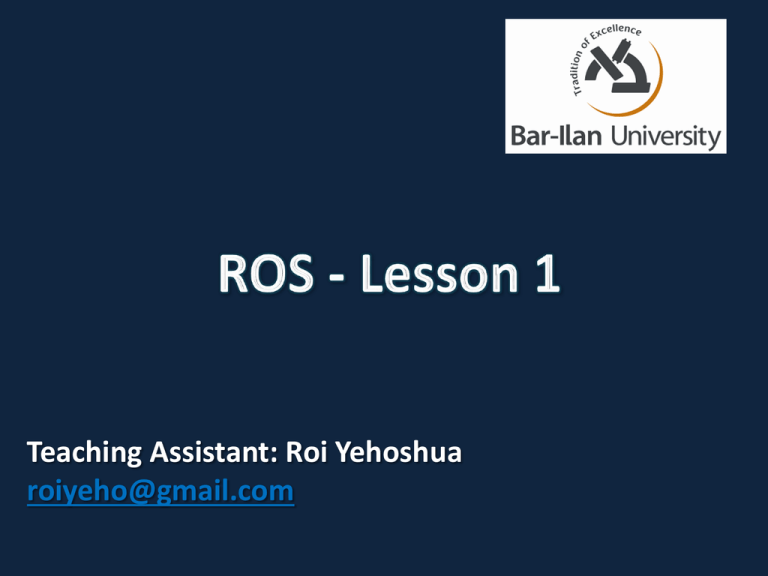
Teaching Assistant: Roi Yehoshua roiyeho@gmail.com Agenda • • • • • Introduction to ROS ROS Main Features ROS Main Concepts Basic ROS Commands Turtlesim Demo (C)2013 Roi Yehoshua 2 The Problem • Lack of standards for robotics (C)2013 Roi Yehoshua 3 What is ROS? • ROS is an open-source robot operating system • The primary goal of ROS is to support code reuse in robotics research and development • ROS was originally developed in 2007 at the Stanford Artificial Intelligence Laboratory • Development continues primarily at Willow Garage, a robotics research institute/incubator (C)2013 Roi Yehoshua 4 ROS Main Features Taken from Sachin Chitta and Radu Rusu (Willow Garage) (C)2013 Roi Yehoshua 5 ROS Main Features • • • • • Hardware and network abstraction Low-level device control Message-passing between processes Implementation of commonly-used functionality Package management (C)2013 Roi Yehoshua 6 Robots using ROS http://wiki.ros.org/Robots (C)2013 Roi Yehoshua 7 ROS Philosophies • • • • Modularity & Peer-to-peer Language Independent Thin Free & Open-Source (C)2013 Roi Yehoshua 8 Modularity & Peer-To-Peer • ROS consists of a number of processes – potentially on a number of different hosts, – connected at runtime in a peer-to-peer topology • No central server (C)2013 Roi Yehoshua 9 Language Independent • Client interfaces: – Stable: roscpp, rospy, roslisp – Experimental: rosjava, roscs – Contributed: rosserial, roshask, ipc-bridge (MATLAB), etc... • Common message-passing layer – Interface Definition Language (IDL) (C)2013 Roi Yehoshua 10 Thin • Library-style development – all development occurs in standalone libraries with minimal dependencies on ROS • ROS re-uses code from numerous other opensource projects, such as the navigation system simulators and vision algorithms from OpenCV (C)2013 Roi Yehoshua 11 Free & Open-Source • Source code is publicly available • Contributed tools are under a variety of opensource (& closed-source) licenses • Promotes code-reuse and community-building (C)2013 Roi Yehoshua 12 ROS Core Concepts • • • • • Nodes Messages and Topics Services ROS Master Parameters (C)2013 Roi Yehoshua 13 ROS Nodes • Single-purposed executable programs – e.g. sensor driver(s), actuator driver(s), mapper, planner, UI, etc. • Modular design – Individually compiled, executed, and managed • Nodes are written with the use of a ROS client library • Nodelets (C)2013 Roi Yehoshua 14 ROS Client Libraries • A collection of code that eases the job of the ROS programmer. • Libraries that let you write ROS nodes, publish and subscribe to topics, write and call services, and use the Parameter Server. • Main clients: – roscpp = C++ client library – rospy = python client library (C)2013 Roi Yehoshua 15 ROS Topics • Nodes communicate with each other by publishing messages to topics • Publish/Subscribe model: 1-to-N broadcasting • Examples: – provide sensor readings – provide actuator states / robot feedback (C)2013 Roi Yehoshua 16 More Complex Example (C)2013 Roi Yehoshua 17 ROS Messages • Strictly-typed data structures for inter-node communication • Messages can include: – Primitive types (integer, floating point, boolean, etc.) – Arrays of primitives – Arbitrarily nested structures and arrays (much like C structs) • For example, geometry_msgs/Twist.msg Vector3 linear Vector3 angular (C)2013 Roi Yehoshua 18 ROS Services • Synchronous inter-node transactions / RPC • Service/Client model: 1-to-1 request-response • Service roles: – carry out remote computation – trigger functionality / behavior • For example, the explore package provides a service called explore_map which allows an external user to ask for the current map (C)2013 Roi Yehoshua 19 ROS Master • The role of the master is to enable ROS nodes to locate one another • Naming & registration services for nodes, topics, services, etc • Run using the roscore command (C)2013 Roi Yehoshua 20 Parameter Server • A shared, multi-variate dictionary that is accessible via network APIs. • Best used for static, non-binary data such as configuration parameters. • Runs inside the ROS master (C)2013 Roi Yehoshua 21 ROS Packages • Software in ROS is organized in packages. • A package contains one or more nodes and provides a ROS interface (C)2013 Roi Yehoshua 22 Package Examples • explore - frontier-based exploration. • move base - implements the action of movement to a destination location • gmapping - provides laser-based SLAM (Simultaneous Localization and Mapping) using a grid map. • stageros - implements two-dimensional robot simulation using Stage. (C)2013 Roi Yehoshua 23 ROS Package System Taken from Sachin Chitta and Radu Rusu (Willow Garage) (C)2013 Roi Yehoshua 24 ROS Package Repositories • Collection of packages and stacks • Many repositories (>50): Stanford, CMU, Leuven, USC, … • Most of them hosted in GitHub • http://wiki.ros.org/RecommendedRepositoryUsa ge/CommonGitHubOrganizations (C)2013 Roi Yehoshua 25 ROS Hydro • • • • Latest ROS version is ROS Hydro Medusa ROS Hydro Medusa is the 7th ROS distribution Released on September 4th 2013 Moved to a new packaging system called catkin (C)2013 Roi Yehoshua 26 ROS Supported Platforms • ROS is currently supported only on Ubuntu – other variants such as Windows and Mac OS X are considered experimental • ROS distribution supported is limited to <=3 latest Ubuntu versions • ROS Hydro supported on: – Ubuntu Precise (12.04 LTS) – Ubuntu Quantal (12.10) – Ubuntu Raring (13.04) (C)2013 Roi Yehoshua 27 ROS Installation • Follow the instructions at: http://wiki.ros.org/hydro/Installation/Ubuntu – Easy installation, takes about 20 mins – Note: Installation takes 2,442MB space of your HD • To test your installation, follow the ROS tutorials: http://wiki.ros.org/ROS/Tutorials (C)2013 Roi Yehoshua 28 ROS Installation (C)2013 Roi Yehoshua 29 Setting Up ROS Environment • Add the following line to your bash startup file (typically ~/.bashrc): source /opt/ros/hydro/setup.bash (C)2013 Roi Yehoshua 30 Basic ROS Commands • roscore – a collection of nodes and programs that are pre-requisites of a ROS-based system • roscore is defined as: – master – parameter server – rosout • Usage: – $roscore (C)2013 Roi Yehoshua 31 Basic ROS Commands • rosrun – allows you to run an executable in an arbitrary package without having to cd (or roscd) there first • Usage: – $rosrun package executable • Example – Run turtlesim • $rosrun turtlesim turtlesim_node (C)2013 Roi Yehoshua 32 Basic ROS Commands • rosnode – Displays debugging information about ROS nodes, including publications, subscriptions and connections • Commands: Command $rosnode list List active nodes $rosnode ping Test connectivity to node $rosnode info Print information about a node $rosnode kill Kill a running node $rosnode machine List nodes running on a particular machine (C)2013 Roi Yehoshua 33 Demo - Turtlesim • In separate terminal windows run: – roscore – rosrun turtlesim turtlesim_node – rosrun turtlesim turtle_teleop_key (C)2013 Roi Yehoshua 34 Demo - Turtlesim (C)2013 Roi Yehoshua 35 ROS Simulators • Stage - 2D Simulator • Gazebo - 3D Simulator • In this course we will use Stage (C)2013 Roi Yehoshua 36 Stage Simulator (C)2013 Roi Yehoshua 37 More Information about ROS • ROS Cheat Sheet – http://u.cs.biu.ac.il/~veredm/89-689/ROScheatsheet.pdf • ROS Tutorial Videos – http://www.youtube.com/playlist?list=PLDC89965A56E6A8D6 (C)2013 Roi Yehoshua 38 Homework (not for submission) • Install ROS • Read and perform all the Beginner Level tutorials – http://wiki.ros.org/ROS/Tutorials (C)2013 Roi Yehoshua 39
